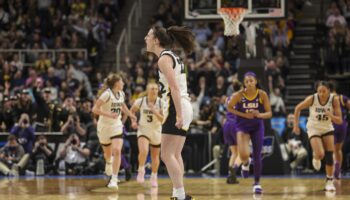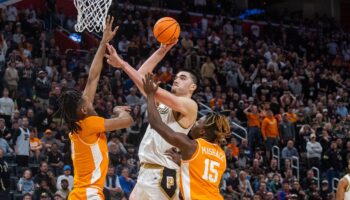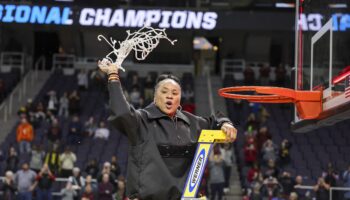 – by Adesina O. Koiki
– by Adesina O. Koiki
A Lot of Sports Talk editor-in-chief
GLENDALE, Ariz. — Not surprisingly, North Carolina head coach Roy Williams, never one to hide his emotions from the public, was filled with a lot of different thoughts and feelings after the Tar Heels’ 71-65 victory over Gonzaga, giving the school its sixth national title.
Let’s take you through some of those emotions, shall we?
Blue Nostalgia
It took 17 years, five separate Final Four appearances and two different schools for Williams to finally win his first national championship back in 2005. Once the final buzzer sounded last night, he couldn’t help but think about his first experience as a head coach in a national championship game, which also involved a well-known school from Tobacco Road.
“Crazy thing is I looked up at the score while we were all celebrating,” said Williams in the postgame press conference. “It was 71-65. In 1991, before these guys were even born, I think I lost the national championship game to Duke, 72-65. So it’s a lot sweeter tonight to say the least.”
That 1991 game in Indianapolis was Williams’ first attempt at winning a national championship, which was followed by another national runner-up result in 2003 when Syracuse defeated the Jayhawks 81-78 in New Orleans. The third time was indeed the charm for Williams, now the coach at North Carolina, to finally lead a team to the national title, in 2005.
Cue the nostalgia again.
“I told the guys in the locker room, 2005, when [assistant coach] Sean May was playing, the team that we beat in the national championship game was 37-1. And that was Illinois. And tonight we got Gonzaga when they were 37-1.”
Tonight’s game also felt like the 2005 national title game in St. Louis, as both that game and the one last night were tied with under two minutes left before a late-game flourish, featuring points scored inside and a pivotal late-game steal, clinched both wins. Tonight, after Justin Jackson’s three-point play gave the Tar Heels a one-point lead with 1:40 left, Isaiah Hicks scored inside off an offensive rebound from Kennedy Meeks to bring the margin to three. On the next possession, Meeks went from provider to rim protector, as he blocked a Nigel Williams-Goss shot inside, leading to a fast break dunk by Jackson to seal the deal. For the cherry on top, Meeks then stole a long pass from Gonzaga big man Przemek Karnowski and the celebrations were on.
Hicks’ basket turned out to be the game-winning field goal, and Williams made sure that the senior post man, who had not been playing well leading up to this game, thought about the past in envisioning success in his final college game.
“Isaiah, my boy has been struggling like a dog, but tonight he looked like a greyhound there a couple times there at the end,” said Williams. “Told him this morning, your last high school game you won the state championship. And he had like 34 points, 30 rebounds. I told him I would take that tonight.”
Blue in the Face
It’s a given that the cloud of expectatios always hangs over the basketball team at Chapel Hill. Over the past four years, however, the cloud of academic fraud has loomed just as large, if not larger.
On Oct. 6, 2014, just days before the start of Midnight Madness and the start of the college basketball season, Kenneth J. Wainstein, an independent investigator appointed by the University of North Carolina, found that for around two decades, starting in 1993, more than 3,000 students – almost half of whom were athletes – benefitted from bogus grades from irregular classes in the Department of African and Afro-American Studies at the school. The investigation was first set into motion by a report from the Raleigh News & Observer and expedited by accusations made by former Tar Heel basketball player Rashad McCants, who played under Williams. He told ESPN’s “Outside the Lines” that he never wrote any of his own papers and that that was a similar experience for other premier players on the team. Many of those classes, Wainstein concluded, helped many athletes stay eligible, with those athletes’ course to graduation buoyed by the sham classes. Two former employees were the point people in this operation, but academic advisers did steer athletes to those classes, and, from the report, “this steering was most prevalent among the counselors for the revenue sports of football and men’s basketball.”
The specter of NCAA sanctions hang over the head of the current constitution of the Tar Heels’ basketball team, which always puts a burr under the saddle of Williams. He previously acknowledged that the program was wrong in creating and fostering the fraudulent classes but unapologetically defends the student athletes he has at the program now.
“I wish it got no attention here, because this should be about the kids,” said Williams after the game. “I wish it got no attention. But I know it’s out there. But the last three or four years have been very hard. I told you, people have questioned my integrity, and that means more to me than anything.”
Williams continued: “I know that [our kids] did nothing wrong. I know that I did nothing wrong. I’ve been investigated 77 times, it seems like. And everybody came to that conclusion. But there were some mistakes made at my university that I’m not happy about either. But there’s also, it always says for little or no work, and that’s not true, or that for classes that weren’t classes, and that’s not — they were taught differently. And whether I approve of it or not it makes no difference. But it’s been there.”
Williams then took the time to talk about the impact it has had with actually bringing potential athletes to Chapel Hill.
“It’s been harder to recruit. We’ve lost about everybody that we tried because the sensationalism of the newspapers. I mean, I had to start defending myself four years ago. And I used to say that I hoped that it was over with before I retired. Now I’m saying I hope it’s over with before I die. So I’m not that happy about that part of it.”
In December, the NCAA sent North Carolina a third separate Notice of Allegations. Regardless of specific details of the widespread fraud we don’t know, we do know that fraud took place. We do know that sanctions are inevitable. We do know that sanctions are necessary, if even a fraction of what was investigated and alleged actually went on.
Even after the Carolina blue and white confetti was shot into the air at University of Phoenix Stadium, the cloud of uncertainty that hangs over the program may color the program for years to come.
True Blue
For 10 years, Williams, who graduated from North Carolina and was on the freshman squad in 1969, was an assistant to the great Dean Smith, and the two won a national championship together in 1982. Eleven years later, after Williams had left to take the head job at Kansas, their paths crossed in both the 1991 and 1993 national semifinals. Williams’ Jayhawks prevailed in 1991 while the mentor came out on top on the way to the Tar Heels winning the 1993 national championship.
Smith’s 1993 triumph gave him his second – and final – national championship. Williams, after last night, passed his mentor with his third national championship.
His standing in the pantheon of college basketball coaching greats doesn’t make him feel comfortable, especially when being mentioned in the same breath as his mentor, which was asked of him on the stage by CBS broadcaster Jim Nantz in the postgame interview.
“You know, Jimmy [Nantz] told me yesterday he was going to ask me that question,” Williams said. “I almost got emotional. I really — I don’t think Roy Williams should ever be put in the same sentence with Dean Smith, I really don’t. I think Coach was the best there’s ever been on the court. And he was an even better person. And so it’s a little staggering.”
Williams said he was overwhelmed seeing the Jumbotron after the game and seeing his name on the list of coaches that have won three or more national championships, a list that does not include Smith but does include Williams.
“But I really — I don’t know what to say. I mean, because that is — I’m very, very lucky. I’m doing what I’ve always wanted to do is to coach kids and trying to get them to have a common goal and make sacrifices. And it’s number three. But they’ve all been fantastic, and I’ve been very fortunate.”




